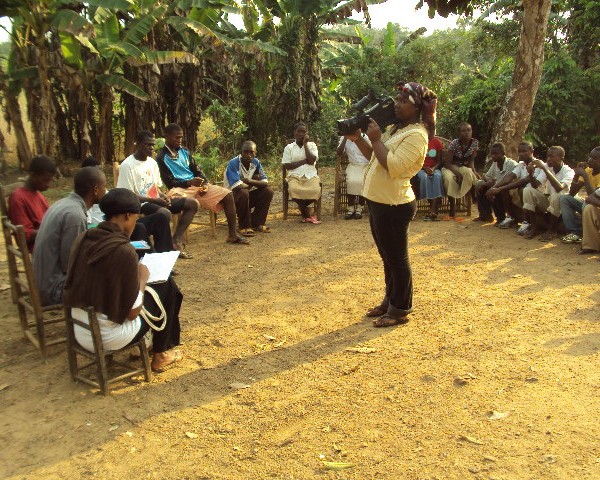Interpeace welcomes adoption of 2030 Agenda for Sustainable Development

As the UN General Assembly prepares to adopt the 2030 Agenda for Sustainable Development later this week, Interpeace joins several other peacebuilding organizations in releasing the joint statement below.
The statement addresses the role of peacebuilding in the 2030 Agenda, which, as stated in the Preamble, ‘seeks to strengthen universal peace in larger freedom’, and articulates in Sustainable Development Goal 16 the aim to ‘Promote peaceful and inclusive societies for sustainable development, provide access to justice for all and build effective, accountable and inclusive institutions at all levels’.
Marking the occasion, Scott Weber, Director-General of Interpeace, said: “Interpeace welcomes the importance that the 2030 Agenda gives to peacebuilding, and in particular the need to create more inclusive societies. We look forward to working together with our partners to overcome sources of exclusion and to strengthen the social contract between citizens and their governments, building on the strengths that bind communities together.”
Facing the challenge of peace
A shared statement by peacebuilding organizations
21 September 2015
On this day, the International Day of Peace, we, a group of peacebuilding organizations from around the world, bring you this message.
The 70th anniversary of the United Nations brings an unprecedented number of major negotiations, reviews and processes that together will frame the work of multilateralism for the next decade and beyond. Next week, the world’s leaders will sign on to the 2030 Agenda for Sustainable Development, which has identified peaceful, just and inclusive societies as one of five cross-cutting priorities for the international community, and there will be high-level discussions on terrorism, UN peace operations and peacebuilding.
Violence is a fundamental dimension of human suffering, just as are poverty and oppression. Violence darkens lives and destroys hope across the world, from remote villages to famous cities, from the poorest countries to the richest. We cannot hope to eliminate extreme poverty, the central aim of the 2030 Agenda, without addressing violence.
Furthermore, we cannot expect to unravel the challenges of today’s world, from terrorism and displacement, transnational crime and repeated cycles of civil war, oppression and state violence, without digging deeper. We must address the roots of violent conflict and instability in economic and political exclusion; injustice, gender and other forms of inequality; insecurity and institutional weakness; and unsustainable resource use. We must consider changing an international system that does too little to raise up the voices, needs and aspirations of the many, rather than the interests of the few. That many of these issues are upheld in the 2030 Agenda is a heartening development, but more needs to be done.
If we accept the premise that the keystone of the UN’s work, across development, humanitarian action and peace and security, needs to be to foster the growth of peaceful, just and inclusive societies, then what changes need to take place – what do we need to do differently?
An initial step would be to use a preventive lens for all development, humanitarian, security and indeed business initiatives, both at the UN and beyond. Leveraged effectively, the 2030 Agenda could help outline a shared approach to addressing and preventing violence at root. The following principles will be vital for the international community to adopt:
- Embrace the universality of the 2030 Agenda: all societies must work towards becoming more peaceful, just and inclusive. Our task is not complete until all human beings, wherever they may live, can fulfil their potential in peace.
- Always seek to understand the context: an effective and inclusive analysis, involving a variety of local perspectives, including youth and women, should be a prerequisite for any external engagement.
- In the planning and implementation of development, humanitarian, economic or security engagement, always seek to do no harm, to ensure that unintentionally or otherwise, the consequences of that engagement do not themselves make things worse, for example by affirming existing or new patterns of political or economic exclusion.
- Focus on increasing resilience, particularly emphasizing the relationship between individuals, their communities and their government. This requires attention to reconciliation and to societies’ capacity to build dialogue, make inclusive and collaborative decisions, and resolve conflicts peacefully.
- Prioritize local needs, the longer term support for peaceful, just and inclusive communities, over external self-interested agendas, particularly short-term security or stabilization objectives.
Alliance for Peacebuilding
American Friends Service Committee
Canadian Friends Service Committee
Causeway Institute for Peace-building and Conflict Resolution International
CDA Collaborative Learning Projects
Centre d’études sur la justice et la résolution 1325 (CRJ 1325)
Centre for Sustainable Development and Education in Africa (CSDEA)
Civil Society Platform for Peacebuilding and Statebuilding (CSPPS)
Conciliation Resources
Cordaid
Fellowship of Christian Councils and Churches in West Africa (FECCIWA)
Friends Committee on National Legislation
Friends World Committee for Consultation – World Office
FriEnt – Working Group on Peace and Development
Generation Agency For Development and Transformation-Pentagon (GADET-Pentagon)
Global Partnership for the Prevention of Armed Conflict
International Alert
Interpeace
Kvinna till Kvinna
Nansen dialogue Centre Serbia
Nonviolent Peaceforce
Pax Christi International
PREGESCO
Quaker United Nations Office
Réseau Femmes et Paix (RFP)
Saferworld
World Federation of United Nations Associations (WFUNA)
World Vision International























